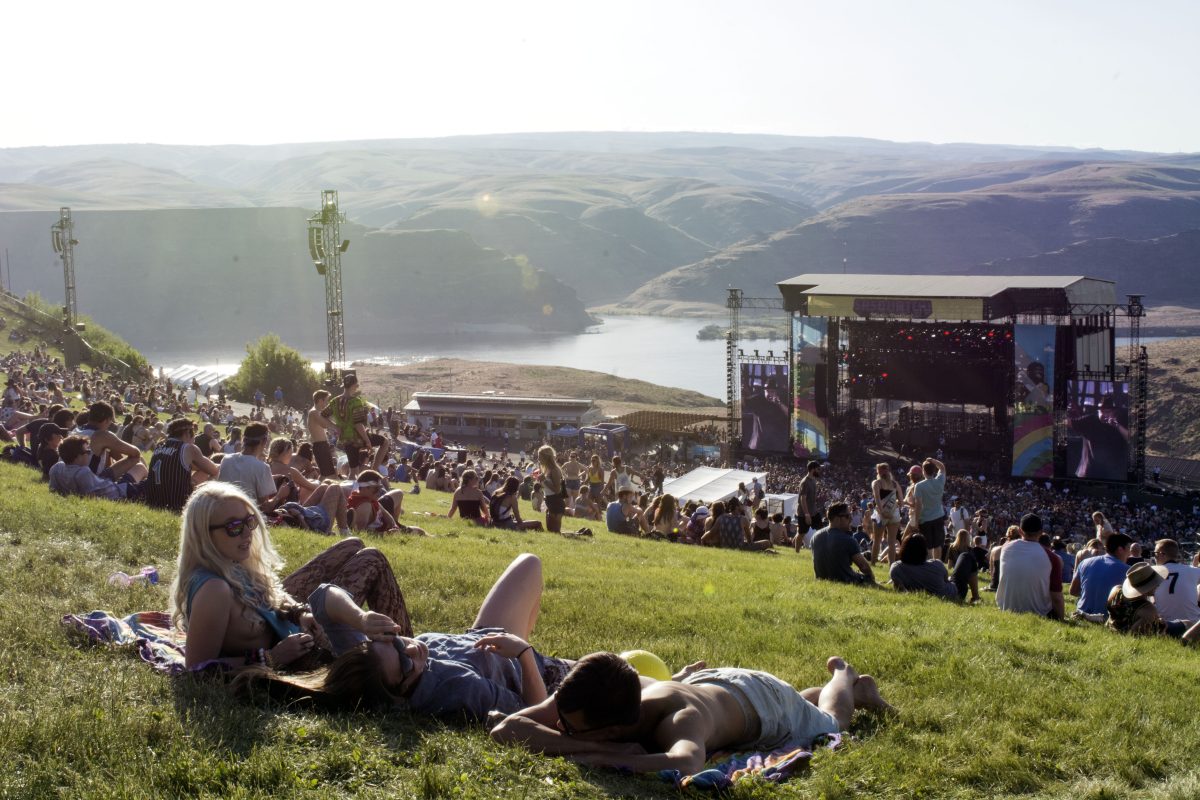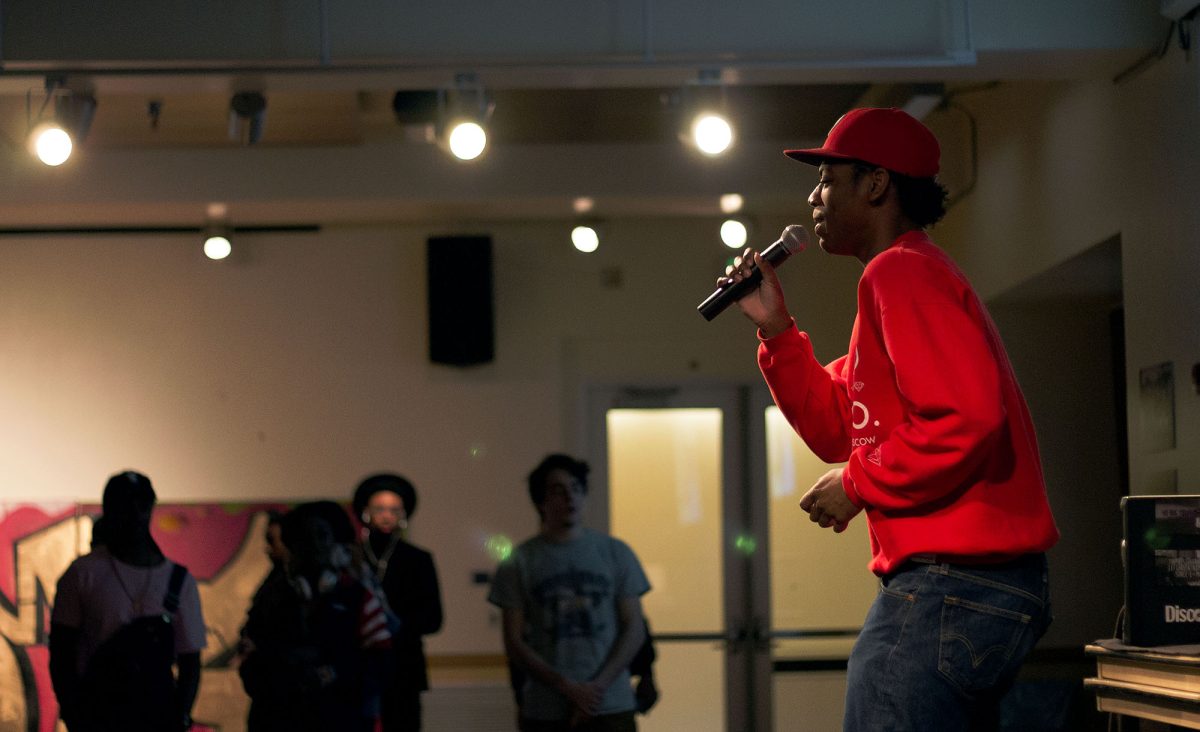Words by Mara Welty, Photos by Natalie Hardwicke
[dropcap]A[/dropcap]li Turki Ali, a Syrian refugee, stands in front of Lane Community College. His eyes gleam as he spots his brother and two nephews turn the corner on the darkened, moonlit street. The two small boys, bundled in puffy green jackets that shield them from the crisp fall air, appear almost turtle-like, their hoods covering their stark black hair.
As they approach, Ali outstretches his arms as the boys, two and four years old, fling themselves into his chest, large smiles stretching across their faces. The older one, Jan, wears a vast universe of freckles on his face – a trait that deems him a ‘moon child’ by his family. As they wait for Ali’s sister-in-law to arrive for an English class, the two boys shyly engage in their surroundings, observing those who pass by with large eyes as their feet dangle from a grated bench.
In early September, Ali’s brother, accompanied by his wife and sons, arrived in Eugene after a two-day journey from Gaziantep, Turkey, a city roughly 40 miles from the Syrian border. From there, the family bussed 16 hours to Istanbul where they boarded a flight to the United States.
In 2013, Ali’s family fled to Turkey, seeking asylum two years following the outbreak of civil war in Syria. The conflict arose from political unrest following the Arab Spring, when protesters demanding President Bashar al-Assad’s removal were violently smothered by the government’s regime. Religious tensions and a belief that Bashar al-Assad had failed to deliver a long promised democratic reform prompted the violence.
The Assad family has ruled Syria since 1971, replacing a long reign of Sunni power. As a result, the Assad family, who are practicing Alawites, were met with religious contempt by the Sunni majority. Alawites are an obscure and marginalized branch of Shi’a Islam socially equivalent to Dalits, or “the untouchables in Indian society. Consequently, the Assad’s rise to power was met with both shock and rage, provoking a series of armed revolts by Sunni Islamists.
At the time of the outbreak, Ali was a high school math teacher in Aleppo. He stayed for three years after the war began, not wishing to abandon his students during a time of dangerous social upheaval. He finally made the decision to flee to Turkey illegally when the military asked him to fight.
It was in Turkey that Ali met Mark Ward, an American diplomat who connected him to the United Nations for refugee resettlement. After a series of demanding interviews and intensive background checks, Ali received news that he was to be placed in the United States, but he would be going alone, thousands of miles from the familiarity of home or family.
“I was shocked and upset,” Ali says. “I wanted to go to the United Kingdom or Europe because that’s where my family was.”
In June 2015, Ali became the first Syrian refugee to arrive in Eugene. In the months following his arrival, Ali took English classes and found a job specializing in retirement plans at Summit Benefits & Actuarial Services in central Eugene.
A soft-spoken man with eager and kind eyes, Ali slowly began to call Eugene home. He speaks about his sponsor – a man who provided Ali with food stamps, registered Ali for school, and searched for job openings – with admiration, now calling his sponsor’s family his own “second family.”
One year later, Ali received notice that his brother’s family would be coming to the United States, but were unable to come to Eugene, as the city lacked a program to facilitate their resettlement within Lane County. Instead, they were to live in Portland, over 100 miles from Ali.
So, Ali and his sponsor spearheaded the Refugee Resettlement Coalition of Lane County – a program run by a group of community members and coordinated by the Catholic Community Services of Lane County (CCS). According to Tom Mulhern, executive director of the CCS, the group maintains regular contact with the families while they assimilate into American society. The organization now accepts up to 35 refugees a year, one of whom Ali hopes will be his younger brother who still remains in Turkey.
Yet, a return to Syria still remains an option for Ali.
“I would like to return to Syria if it’s safer than before,” Ali says. “Or better.”
But now as the wind blows in Eugene, Ali grasps his youngest nephew closely to him, speaking to him in a hushed murmur as the boy listens intently before his attention is broken and his eyes dart wildly down the street. With a rustle and a sudden leap, the boy escapes from his uncle’s arms, racing down the sidewalk towards a shadowed figure. He returns to the group clasping her hand. The child and his mother approach with an eagerness, greeting Ali’s brother and oldest nephew with hugs and kisses. Ali looks on silently, a grin forming below his calm eyes.
“I came here alone,” says Ali. “But for [my family] it was different. They have this group to help them here, along with my friends and my second family. They don’t have to feel alone.”
Ali pictured on a hike with his brother and nephew. Ali’s family was resettled in Eugene in September 2016, almost a year after Ali moved to Eugene.















